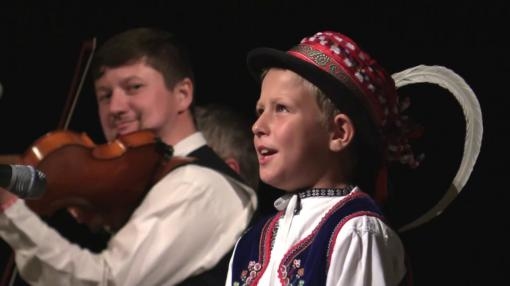At the end of November, a CD entitled Moravian Voices was released. Modest at a first glance, this album should definitely not miss out on your attention. This music carrier is a part of the Song of the Soul project, whose promoter is Jiří Plocek. Its aim was to introduce the phenomenon of Moravian singability with the example of some areas of Slovácko (Moravian Slovakia).
The album features twenty-eight songs recorded without instrumental accompaniment. In the final selection of artists, the author drew on his long-term editorial work for Czech Radio Brno and from his publishing and dramaturgical practice. Hence, besides the necessary experience, he also has a sophisticated sensibility.
The absence of musical accompaniment can be discouraging for some listeners. No spontaneous violin, no spectacular dulcimer solos, nothing that would support the human voice; but there is nothing that would overshadow it either. That is why voices are represented in their purest simple beauty.
Folk music is, of course, an indispensable part of traditional culture. However, it cannot be taken as an integral part of a song. When people used to sing at work or on everyday occasions, they could hardly get an instrumental accompaniment. Therefore, this approach can be considered one of the ways of returning to the roots of a folk song.
All of this has now been supported by the fact that the singers themselves chose what they would sing on the album. We are brought even deeper to the roots by the selection of places where the recordings were made. At times when the folk song was still a normal part of life, it was also the case with religion, its liturgy and participation in ceremonies. That is why places where such ceremonies take place were chosen for the purpose of the recording – the Synagogue in Břeclav, the Evangelical Church in Javorník and the Chapel of St. Joseph in Kyjov. Moreover, these are spaces with naturally high-quality acoustic properties that support a voice without instrumental accompaniment.
These places have also become another guide to the selection of vocalists. They determined the catchment areas of Podluží and Hanácké Slovácko, Horňácko and Strážnicko and Kyjovské Dolňácko. Jiří Plocek chose one male vocal choir from each region, then two female vocal choirs, several smaller singing groups and a number of soloists. It is not without interest that the age spread between the youngest singer Ondřej Maňák and the oldest Oldřich Krejčí is exactly 100 years.
Not all the singers who appear on the album can be named. Therefore, I will present only some of those who form this broad palette of colours of the human voice.
I should like to mention the singer Jana Otáhalová from Podluží, who has released her debut album recently. She sang both as a soloist and in a trio with her friends Eva Skočíková and Anežka Herková. For the region of Horňácko, Janíček Pavlík cannot be missed out; in his nine years, he has impressed many with his pure and sincere expression. Others are, for example, the vocal choir Zpěvulenky from Čeložnice, Anna Múčková and the brothers Varmuža.
The approach taken in the recording of this album is far from conventional, but all the more interesting. As Jiří Plocek himself admits, he is not a "folklorist". In the introductory text in the booklet, he mentions that he had met with folk songs as a little boy, but only much later, a spark in his heart was lit when he was listening to "majstr" Martin Hrbáč from the region of Horňácko. Over time, he got still closer to folk music thanks to his cooperation with Czech Radio Brno and the folk music ensemble BROLN. A view from the outside is often unburdened with habits and can be an awakening for those who perhaps live enclosed in a determined group but are willing to listen nonetheless.
The most important message that this album brings to me is the testimony that some of the original functions of a song may perhaps have been preserved. Although it often seems so, thanks to the energy of human voice that is embedded in the song it can never become mere background scenery without the added value of emotional experience. The song must be sung, listened to and – above all – lived. Lived inside it or at least with it.
































No comment added yet..